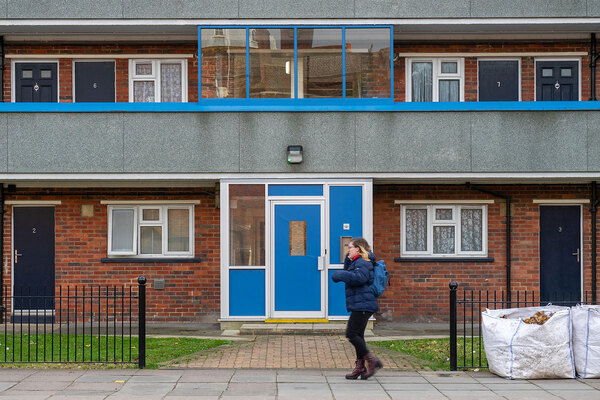You are viewing 1 of your 1 free articles
The sector’s response to the rent settlement
The government launched a consultation on the future of rent policy for social landlords in October last year. It published the sector’s responses just before Christmas. James Riding looks at some of the main points
Social rents, which are set by the government, make up the bulk of social landlords’ income – so Labour’s rent policy is critical to the future of the sector.
A careful balance must be struck. Allowing landlords to raise rents helps them to build more homes and improve their existing stock, but this comes at a cost to tenants and to the Treasury via higher benefit spending.
Alongside the 2024 Autumn Budget, chancellor Rachel Reeves proposed a new social rent policy: social landlords can increase their rents by up to Consumer Price Index (CPI) plus 1% per year, for five years, from 2026-27 to 2030-31.
Housing organisations submitted their responses to the government’s plan before Christmas, and the final policy is expected to be announced around the time of the Spring Spending Review in late March. This is a summary of what the sector is hoping to secure.
‘The longer the settlement lasts, the better’
The National Housing Federation (NHF) called the proposals “a positive first step”, but warned they would not be sufficient to reverse the decline in affordable housebuilding and help the government hit its target of 1.5 million new homes.
It asked for a convergence mechanism to be added to the rent settlement, allowing housing associations to gradually raise rents that are below the earnings-linked rent formula. According to the NHF, rent convergence could unlock 90,000 new homes by generating £3.5bn in additional rental income over 10 years.
An additional £3 per week in convergence would be affordable to residents even on the lowest incomes, it argued, and would only result in a rise of up to 0.6% on government welfare spending on housing support by 2030.
“The longer the rent settlement lasts, the better,” the NHF said, adding that its preferred option is 10 years to give landlords and investors greater certainty. However, the organisation added that it would support a rolling settlement that allows the government to consult five years in advance if it wants to change the policy.
It also called for additional rent flexibility for supported housing and housing schemes for older people, rising from 10% to 20%, so rents “better reflect the additional non-service-related costs” of building and maintaining these developments.
‘Rents alone cannot cover the cost of meeting the government’s objectives’
The Chartered Institute of Housing (CIH) said that the government’s proposal of CPI+1% for five years “will not go far enough to provide the stability required”. It advocates for a 10-year rent settlement, “if possible set in statute”, which it said would provide additional income of £5.6bn for local authorities and £7.4bn for housing associations.
Like the NHF, the CIH is strongly in favour of rent convergence. “Without convergence, it is clear from our members that all additional capacity created by CPI+1% for 10 years would need to be invested in existing homes,” it said. A convergence mechanism would increase the total additional rental income over 10 years to £11.6bn for local authorities and £10.7bn for housing associations.
Finally, the CIH warned that rents alone cannot cover all the costs of achieving the government’s objectives for the sector, adding that “a significant increase in grant funding is required” at the Spring Spending Review.
Gavin Smart, chief executive of the CIH, said: “Long-term certainty, combined with sustained grant investment, is essential to improving the quality of existing homes and delivering the government’s ambition of building 1.5 million new homes this parliament.”
‘Ambitious targets require ambitious policy’
The British Property Federation (BPF), which represents developers and for-profit housing providers, joined calls for a 10-year rent settlement.
Its independent analysis found that at least £20bn of private capital is ready to be deployed into UK social housing if the policy environment is “supportive”. Assuming investors use 50% debt financing, and an average unit cost of £250,000, a 10-year rent settlement could help unlock 240,000 additional social homes over a five-year period.
Ian Fletcher, policy director at the BPF, said: “Ambitious housing targets require ambitious policy.”
He said that 10-year rolling rent settlements would attract private investment and raise the valuation of existing homes, increasing the capacity of housing associations to invest.
“A five-year policy would not deliver the same boost, and delivery would continue to be restricted, particularly as providers face challenges around upgrading older stock and meeting building safety requirements,” he added.
‘Transcend the electoral cycle’
Places for People, the 230,000-home housing association, gave three reasons why it preferred – you guessed it – a 10-year social rent settlement.
“First, it will truly give housing providers the long-term ability to effectively plan their finances; second, its duration will transcend electoral cycles and minimise the impact of political change; and third, it will attract sustainable investment into our sector,” it said.
The political change point is key. Given each electoral cycle is five years, how can we know a government’s promise of a 10-year settlement is worth the paper it is written on? Places for People’s idea is for the government to “take steps to ensure that any future changes to the settlement require the approval of parliament”.
‘CPI+1% for 10 years is an absolute minimum’
The Local Government Association (LGA) put the case for rent convergence bluntly: “Council Housing Revenue Accounts need CPI+1% for 10 years as an absolute minimum, but this will still result in a national Housing Revenue Account deficit and is highly unlikely to support an uptick in new build.”
Rent convergence at either an additional £2 or £3 per week delivers cumulative surpluses of up to £1bn by 2036-37, potentially enabling “all existing stock pressures to be addressed”, with some capacity for additional development.
However, such a projected move to surplus would only take effect in 2034, meaning that for deficits to be addressed, there will need to be “additional funding resources” for councils other than higher rents in the medium term.
The LGA called for the government’s ‘new burdens doctrine’, which states that all new burdens placed on councils by central government must be fully funded, should be extended to Housing Revenue Accounts so that local authorities do not have to “cost-in” the risk to their business plans.
Finally, it argued that the final rent policy should be put into primary legislation, with a commitment to reimburse councils in full for any shortfall in income should the government deviate from the settlement.
Placeshapers, a membership body for medium-sized, geographically concentrated housing providers, also set out a case for rent convergence, with case studies from Greatwell Homes, Worthing Homes and Aspire Housing setting out “the positive impact this could have on their communities”.
“We welcome the acknowledgement in the consultation that the delivery of the government’s objectives on housing depend not just on the rent settlement, but on future levels of government investment, including grant levels for social housing and additional funding where there are new expectations on the sector, for example through a new Decent Homes Standard,” it added.
‘NICs rise has eroded financial headroom’
The Northern Housing Consortium (NHC), which represents housing associations, local authorities and ALMOs across the North of England, gave a full-throated endorsement of a 10-year rent settlement.
This would reduce the cost of debt for affordable housing providers, “allow them to plan investment and development programmes with greater confidence, and provide affordable housing providers in the North with an additional £18.68bn of income to invest in homes over their 30-year business plan period”, it said.
Analysis by Savills found that under a 10-year rent settlement of CPI+1%, the required yield on housing sector debt would be 0.45% lower than under CPI only. This benefit would only be 0.24% under a policy of CPI+1% for five years.
“From the perspective of government and HM Treasury then, extending the proposed rent policy to 10 years will help get more homes delivered with no increase in up-front grant funding,” the NHC said.
The consortium also backed rent convergence at either £2 or £3 per week, which would “significantly improv[e] the position of Housing Revenue Accounts and housing association interest cover”.
It warned that CPI+1% for five years would merely “maintain current levels of delivery without finances deteriorating significantly further”, and would not be enough for a big scale-up in housebuilding as the government hopes.
The NHC added that “much of the increased financial headroom provided by the proposed rent policy has been eroded” due to the chancellor’s increase in employer National Insurance contributions (NICs), announced in October.
The tax rise will be especially painful for landlords running supported housing or extra care schemes. It pointed to analysis by Savills which suggested that these changes will cost local authorities £50-60m per year, while the cost to housing associations will be over £100m per year.
The NHC also pointed out that the housing sector had previously been promised certainty on rental income, which was later reneged on. In 2013, the previous government pledged a 10-year rent policy of CPI+1%, but then decided to cut rents for four years from 2016 and cap rents in 2022-23.
Like the CIH, it suggested that government put a long-term rent settlement into statute, ensuring any move away from the policy would require approval via a vote in parliament. “This would mark a significant step beyond what the previous government had provided – whose policy was based entirely on trust – and help the housing sector to believe that the policy would not be departed from other than in the most severe situations,” it said.
The need for a vote would also provide an opportunity for scrutiny and debate from MPs and peers over the “questions and trade-offs related to social housing rent policy, affordability and stock investment requirements”, rather than relying on “unilateral executive action” as is currently the case.
A Ministry of Housing, Communities and Local Government spokesperson said: “We want to give housing associations and councils the rent stability they need to borrow and invest in new and existing homes. This needs to be balanced with giving appropriate protections for existing and future social housing tenants.
“The government will issue its response to the consultation in due course.”
Sign up for our daily newsletter
Already have an account? Click here to manage your newsletters












